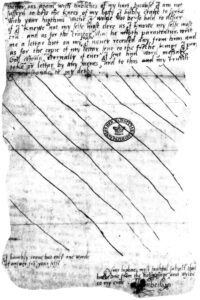The Tide Letter was written by Elizabeth to Mary I when she was arrested after Wyatt’s Rebellion. Elizabeth wrote it when she was just about to be taken to the Tower of London for incarceration and it is called the Tide Letter because as Elizabeth wrote the letter the tide of the Tames turned and she could no longer be taken to the Tower by boat that day.
The letter was written in haste but Elizabeth still managed to write an eloquent and well-argued letter, which unfortunately went ignored by Mary. It did, however, delay her imprisonment by one day.
The Tide Letter
If any ever did try this old saying, ‘that a king’s word was more than another man’s oath’, I most humbly beseech your majesty to verify it to me, and to remember your last promise and my last demand, that I be not condemned without answer and due proof, which it seems that I now am; for without cause proved, I am by your Council from you commanded to go to the Tower, a place more wanted for a false traitor than a true subject, which though I know I desire it not, yet in the face of all this realm it appears proved.
I pray to God I may die the shamefullest death that any ever died, if I may mean any such thing; and to this present hour I protest before God (Who shall judge my truth, whatsoever malice shall devise), that I never practised, counselled, nor consented to anything that might be prejudicial to your person any way, or dangerous to the state by any means. And therefore I humbly beseech your majesty to let me answer afore yourself, and not suffer me to trust to your councillors, yea, and that afore I go to the Tower, if it be possible; if not, before I be further condemned. Howbeit, I trust assuredly your highness will give me leave to do it afore I go, that thus shamefully I may not be cried out on, as I now shall be; yea, and that without cause.
Let conscience move your highness to pardon this my boldness, which innocency procures me to do, together with hope of your natural kindness, which I trust will not see me cast away without desert, which what it is I would desire no more of God but that you truly knew. Which thing I think and believe you shall never by report know, unless by yourself you hear. I have heard in my time of many cast away for want of coming to the presence of their prince; and in late days I heard my Lord of Somerset say that if his brother had been suffered to speak with him he had never suffered; but persuasions were made to him so great that he was brought in belief that he could not live safely if the Admiral lived, and that made him give consent to his death. Though these persons are not to be compared to your majesty, yet I pray God the like evil persuasions persuade not one sister against the other, and all for that they have heard false report, and the truth not known.
Therefore, once again, kneeling with humbleness of heart, because I am not suffered to blow the knees of my body, I humbly crave to speak with your highness, which I would not be so bold as to desire if I knew not myself most clear, as I know myself most true. And as for the traitor Wyatt, he might peradventure write me a letter, but on my faith I never received any from him. And as for the copy of the letter sent to the French king, I pray God confound me eternally if ever I sent him word, message, token, or letter, by any means, and to this truth I will stand in till my death. Your highness’s most faithful subject, that hath been from the beginning, and will be to my end, Elizabeth I humbly crave but only one word of answer from yourself

Thanks to Lara E Eakins of TudorHistory.org for this photo.
Thanks to little_miss_sunnydale on flickriver for transcript.











I read your statement that Thomas Wyatt was a distant relative of Elizabeth. Can you tell me how they could be related or where I could find that information? Thomas Wyatt (Waite) is my 14th great grandfather. I would greatly appreciate any guidance that you could give me. Sincerely, Lynne Waite Ray